When faced with the loss of one or more teeth, individuals often ponder the significant question of whether to opt for a bridge or implant. This decision can impact oral health, functionality, and aesthetics. With various factors to consider, including treatment procedures, longevity, and costs, it’s essential to delve into the nuances of each option to make an informed choice.
What Is a Dental Bridge?
A dental bridge is a common prosthetic solution for replacing missing teeth. This technique anchors a false tooth or teeth to adjacent healthy teeth, creating a bridge-like structure.
Definition
A dental bridge consists of one or more prosthetic teeth (known as pontics) that are securely anchored to neighboring natural teeth, which are called abutment teeth. These abutments are typically crowned to ensure stability for the bridge. The result is a cohesive structure that provides both aesthetic appeal and functional utility.
Types of Dental Bridges
There are several types of dental bridges, and they vary based on the specific needs and health of the patient. The four main types include:
- Traditional Bridges: The most common type, traditional bridges utilize crowns on both sides of the missing tooth to anchor the pontic in place.
- Cantilever Bridges: Used when there’s only one adjacent tooth, these are secured to that single tooth, providing a less extensive solution.
- Maryland Bridges: Designed with a metal or porcelain framework, these bridges are bonded to the back of the adjacent teeth, usually for front teeth replacements.
- Implant-Supported Bridges: In cases where multiple teeth are missing, this option uses dental implants to replace the roots and support the bridge, providing a stable foundation.
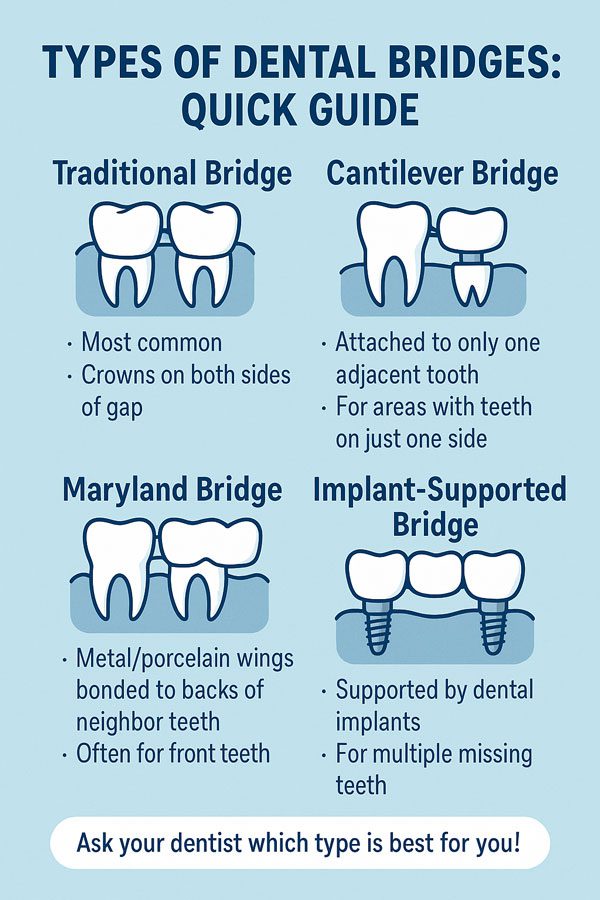
When It’s Commonly Used
Bridges are typically employed when one to three adjacent teeth are missing. They are an effective solution to restore the smile and allow proper chewing functionality without the need for extensive surgical procedures. Bridges can also address gaps caused by teeth lost due to decay or injury, allowing for improved oral health and aesthetics.
What Is a Dental Implant?
Dental implants represent a more advanced tooth replacement method. They involve surgically placing a titanium post in the jawbone to act as the root of a new tooth.
Definition
A dental implant consists of a titanium post surgically inserted into the jawbone, mimicking the root of a natural tooth. After the dental implant integrates with the bone tissue — a process called osseointegration — it is completed with an abutment that connects to a custom-made crown.
Structure and Function
The structure of a dental implant includes:
- Titanium Post: This biocompatible post serves as the tooth root replacement and is designed to fuse with the jawbone for stability and strength.
- Abutment: This connector piece sits on top of the titanium post and holds the crown securely in place.
- Crown: The visible part of the tooth that matches the color and shape of natural teeth, providing both functionality and aesthetic appeal.
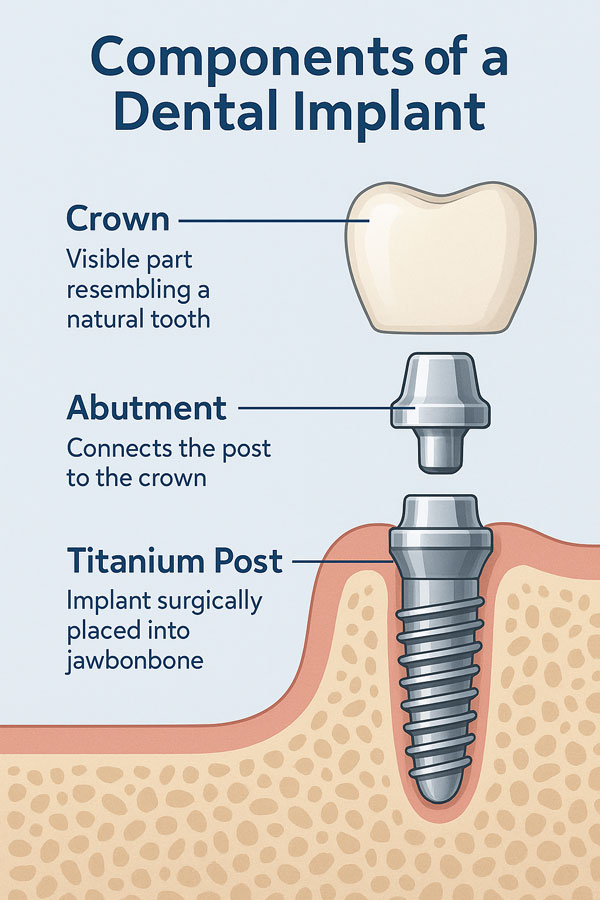
Advantages of Dental Implants
The main advantage of dental implants is that they offer a function similar to natural teeth. Unlike bridges, which rely on adjacent teeth for support, implants stand alone, thereby preserving the surrounding healthy teeth. They are engineered to last longer than bridges, usually functioning for 15 to 25 years with proper care.
Dental Bridge vs Implant: Key Differences
Understanding the differences between a dental bridge vs implant can help in deciding the most suitable option for your situation. Here we outline some critical distinctions.
Procedure
- Dental Bridge: This non-surgical, less invasive procedure typically requires two visits. The first appointment involves preparing the abutment teeth and taking impressions. The final fitting occurs after the bridge is crafted.
- Dental Implant: This surgical option necessitates a greater commitment. The procedure may take several months from the initial placement of the implant to the final crown, requiring adequate healing time for osseointegration.
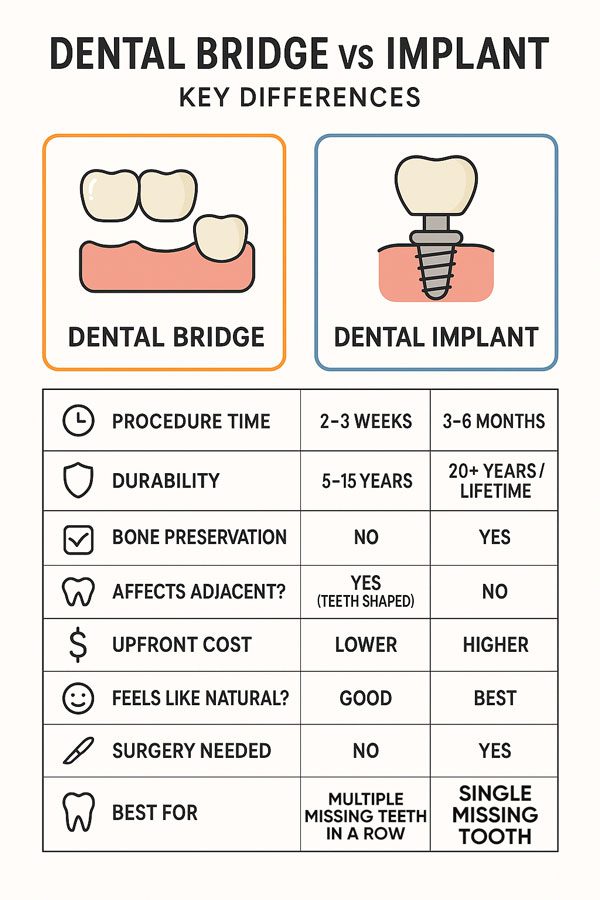
Longevity
- Dental Bridge: Depending on care and oral hygiene, bridges typically last between 5 and 15 years.
- Dental Implant: Generally, implants outlast bridges, offering functionality for over 15 years, and sometimes exceeding two decades with proper care.
Effect on Nearby Teeth
- Dental Bridge: Because neighboring teeth must be filed down or modified to accommodate bridge crowns, some healthy structures are sacrificed.
- Dental Implant: Implants do not affect adjacent teeth, preserving their natural integrity.
Bone Preservation
- Dental Bridge: A significant drawback is that bridges do not prevent bone loss in the jaw where the tooth is missing, which can lead to further dental issues.
- Dental Implant: These implants provide stimulation to the jawbone akin to natural tooth roots, helping to prevent bone loss that can occur after tooth extraction.
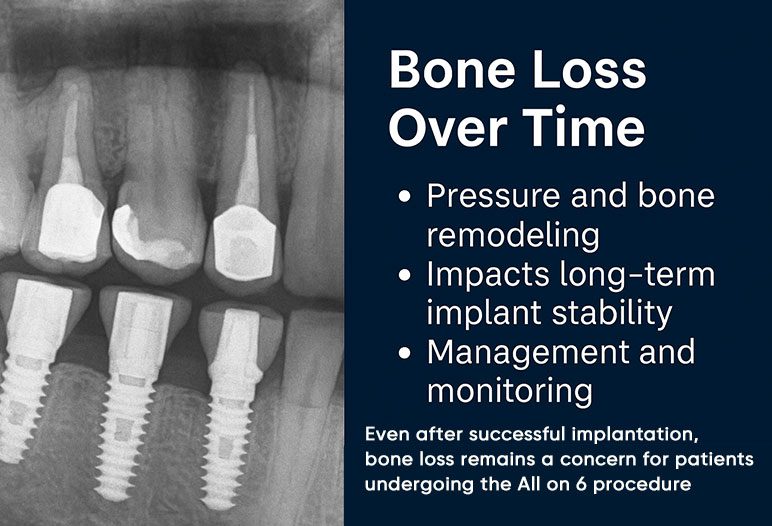
Cost
- Dental Bridge: Initial costs range from $1,500 to $4,000, making them a more budget-friendly option upfront.
- Dental Implant: The cost per implant is higher, usually between $3,000 to $6,000. However, the long-term value may justify the initial investment.
Which Is Better: Bridge or Implant?
Choosing between a bridge or implant can depend on several individual factors. Understanding these can guide you towards a decision that best suits your needs.
Factors to Consider
- Number of Missing Teeth: If losing many adjacent teeth, an implant-supported bridge may be more beneficial.
- Bone Health: A crucial aspect of getting dental implants involves having sufficient healthy bone to support the implant. If bone loss has already occurred, bone grafting may be necessary.
- Budget: If the lower initial cost is your priority, a bridge may be more attractive. However, consider the potential need for replacements over time.
- Age and Overall Health: Older patients or those with medical conditions may not be ideal candidates for surgery and may consider the less invasive bridge option.
- Personal Preference for Permanence: Many patients prefer the durability and stability of implants, while others might be more comfortable with the traditional bridge approach.

Expert Recommendation
If your bone health is sound and your budget permits, dental implants generally offer more long-term benefits, enhancing overall dental health and stability. Consulting with a dentist can yield further insights tailored to your personal health requirements.
Cost Comparison
When considering tooth replacement options, financial implications play a significant role. Here’s a breakdown of average costs associated with both choices:
- Dental Bridge: Ranging from $1,500 to $4,000, bridges are less expensive initially but may incur costs for replacements years down the line.
- Dental Implant: The cost of $3,000 to $6,000 per implant reflects the advanced nature of the procedure and materials used. An implant bridge (for several teeth) typically costs between $5,000 and $10,000.
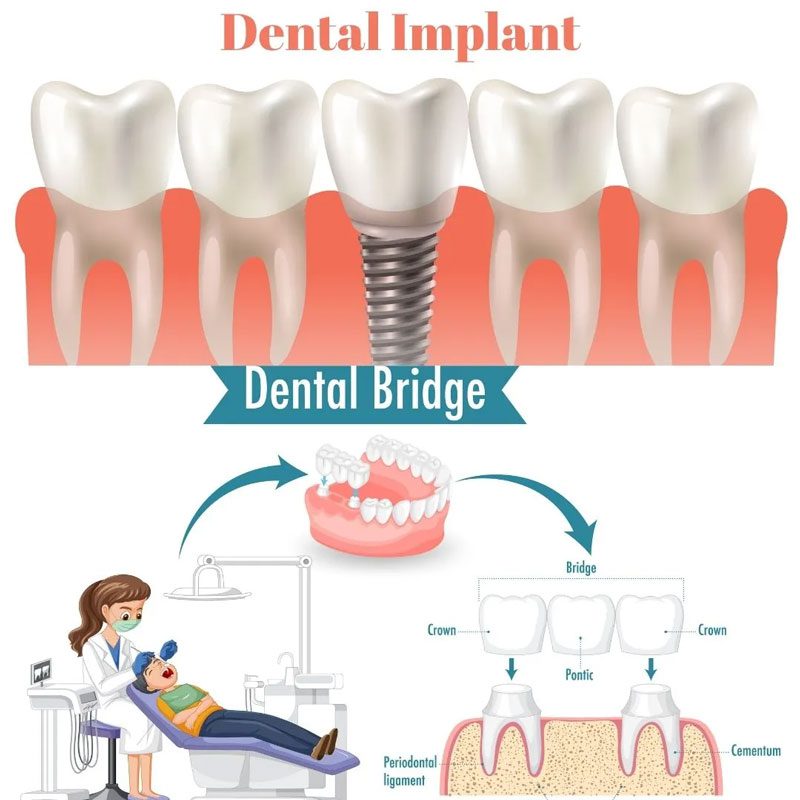
Financing and Insurance Options
Options for managing the costs of these procedures may include:
- Dental Insurance: Some plans cover part of the procedure cost, particularly for bridges.
- Payment Plans: Many dental clinics offer financing options, allowing for manageable monthly payments.
- Dental Tourism: Patients exploring international options may find quality dental services at lower prices, with countries like Vietnam being popular for dental tourism, especially for implants.
Pros and Cons Summary
Dental Bridge – Pros
- Faster treatment: Bridges typically require less time than implants.
- Lower upfront cost: Cost-effective for immediate needs.
- No surgery involved: A less invasive option for patients wary of surgery.
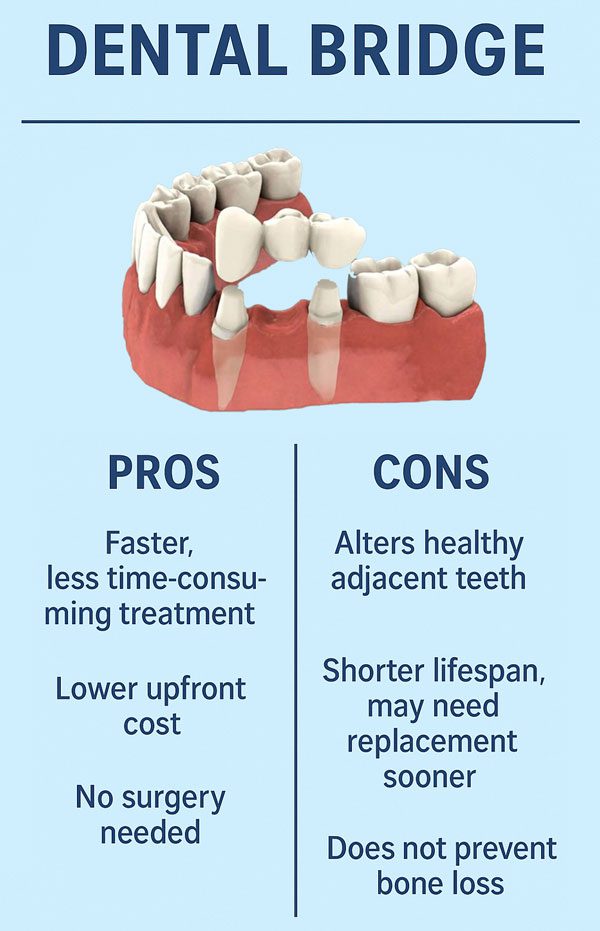
Dental Bridge – Cons
- Affects healthy teeth: Requires alteration of adjacent teeth, which can lead to future problems.
- Shorter lifespan: Generally requires replacement sooner than an implant.
- Doesn’t stop bone loss: It leaves the underlying bone unsupported.
Dental Implant – Pros
- Long-lasting: A highly durable solution with the potential for decades of service.
- Preserves bone: Supports jaw health and prevents further complications.
- Natural aesthetics: Provides a realistic look and feel similar to natural teeth.
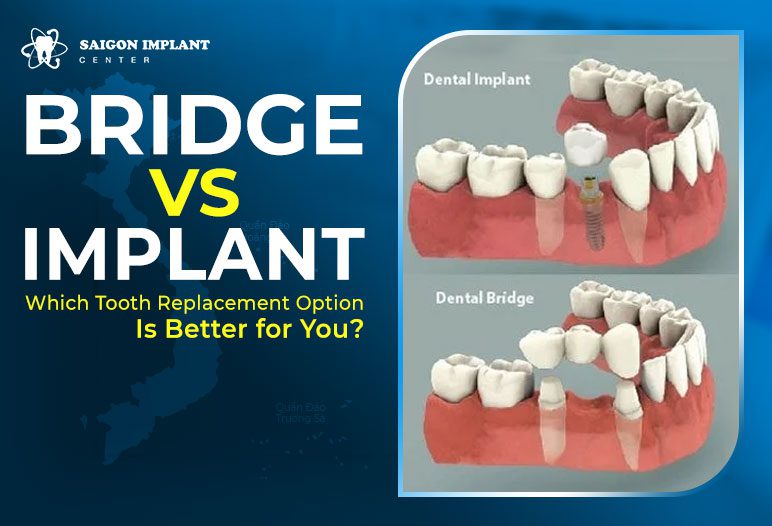
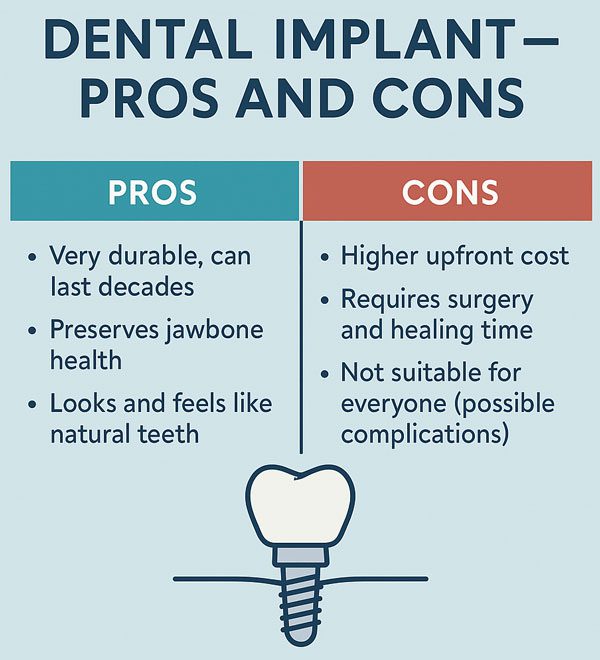
Dental Implant – Cons
- Higher cost: Upfront investment can be significant.
- Requires surgery and healing: May be intimidating for some individuals.
- Not ideal for everyone: Possible complications or contraindications can limit candidacy.
Conclusion
In summation, the choice between a bridge or implant hinges on personal circumstances, preferences, and dental health conditions. While both options have their merits, implants generally present a more durable and health-conscious choice if feasible. Always consult with your dentist to assess your needs and develop the best plan tailored to achieving a functional and beautiful smile. Remember, investing in your dental health today can ensure a long-lasting, confident smile for years to come.

 Google Reviews
Google Reviews Call
Call
SAIGON IMPLANT CENTER
Best dentist in Vietnam
Saigon Implant Center - Dental Clinic utilizes the latest technology for specialized treatment in the field of Single implant, full jaw implants, All on 4 implants, All on 6 implants, Zygoma implant....
SAIGON IMPLANT CENTER
Best dentist in Vietnam
Saigon Implant Center - Dental Clinic utilizes the latest technology for specialized treatment in the field of Single implant, full jaw implants, All on 4 implants, All on 6 implants, Zygoma implant....